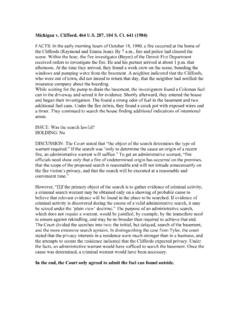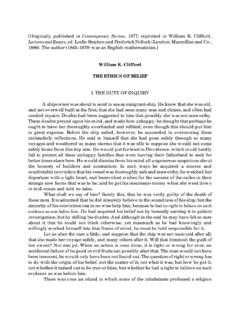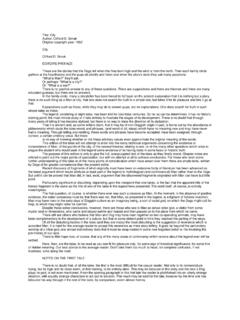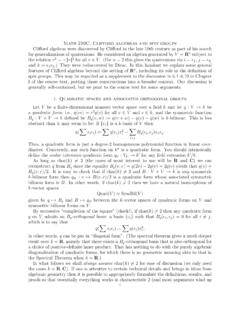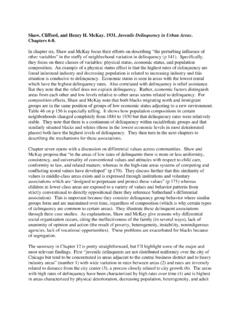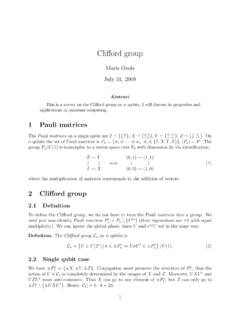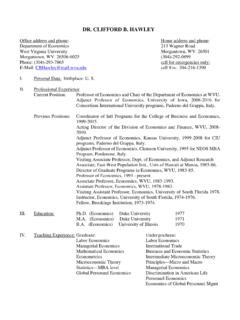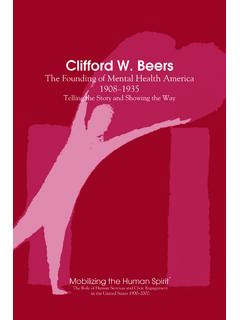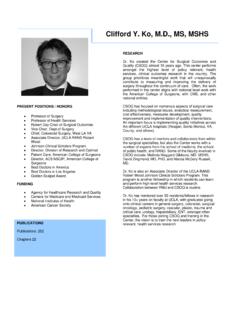Transcription of Alexander Meleagrou-Hitchens, Seamus Hughes, Bennett …
1 Alexander Meleagrou-Hitchens, Seamus Hughes, Bennett CliffordFEBRUARY 2018 THE TRAVELERSA merican Jihadists in Syria and IraqBY Alexander Meleagrou-Hitchens, Seamus Hughes, Bennett CliffordProgram on ExtremismFebruary 2018 All rights reserved. Printed in the United States of America. No part of this publication may be reproduced or transmitted in any form or by any means, electronic or mechanical, including photocopy, recording, or any information storage and retrieval system, without permission in writing from the publisher. 2018 by Program on ExtremismProgram on Extremism 2000 Pennsylvania Avenue NW Washington, DC 20006 ..vA Note from the Director ..viiForeword ..ixExecutive Summary ..1 Introduction: American Jihadist Travelers ..5 Foreign Fighters and Travelers to Transnational Conflicts: Incentives, Motivations, and Destinations.
2 5 American Jihadist Travelers: 1980 2011 ..6 How Do American Jihadist Travelers Compare to Other Western Counterparts? ..8 Methodology and Statistics ..11 Definitions ..12 Statistics ..17 Category 1: Pioneers ..23 Abdullah Ramo Pazara ..23 Ahmad Abousamra ..30 Pioneers: Enduring Relevance for Jihadist Groups ..35 Category 2: Networked Travelers ..39 Clusters ..39 Families ..46 Friends ..49 Networked Travelers: Why Strength in Numbers Matters ..52 Category 3: Loners ..55 Mo ..55 Mohamad Jamal Khweis ..62 Loners: Can Virtual Networks Replace Physical Recruitment? ..68 Returning American Travelers ..71 Recruitment, Returnees, Reintegration: Challenges Facing the Regarding Jihadist Travelers ..71 Abdirahman Sheik Mohamud ..73 Criminal Justice Approaches to Returning Travelers ..75 Addressing the Threat of American Jihadist Travelers.
3 87 The Travelers: american JihadisTs in s yria and iraq | vAcknowledgementsThis report was made possible by the dedicated and tireless work of the Program on Extremism s staff. The au-thors wish to thank the Program s Director Dr. Lorenzo Vidino, as well as research fellows Audrey Alexander , Katerina Papatheodorou, and Helen Powell for their invaluable insight and significant contributions to the meth-odology and construction of this report. Several of the Program s research assistants, including Silvia Sclafani, Tanner Wrape, Sarah Metz, Grant Smith, Gianluca Nigro, and Aaron Meyer, assisted in editing and verifying the final product. The authors also thank Larisa Baste for designing this views expressed in this publication are solely those of the authors, and not necessarily those of the George Washington Program on ExtremismThe Program on Extremism at the George Washington University provides analysis on issues related to violent and non-violent extremism.
4 The Program spearheads innovative and thoughtful academic inquiry, producing empirical work that strengthens extremism research as a distinct field of study. The Program aims to develop pragmatic policy solutions that resonate with policymakers, civic leaders, and the general Travelers: american JihadisTs in s yria and iraq | viiA Note from the DirectorSince its foundation, the Program on Extremism has made analysis of all aspects of the Syria and Iraq-related jihad-ist mobilization in the United States one of its cornerstones. In 2015, it released its f lagship report, ISIS in America: From Retweets to Raqqa, which provided the foundation for various congressional hearings and is currently used as a training text by law enforcement and intelligence agencies throughout the country. The Program then released several groundbreaking studies: Cruel Intentions: Female Jihadists in America, a seminal study on the radicalization of women; Fear Thy Neighbor: Radicalization and Jihadist Attacks in the West, which analyzed all jihadist attacks in the West since the declaration of the Caliphate; and Digital Decay: Tracing Change Over Time Among English-Language Islamic State Sympathizers on Twitter, part of the Program s larger effort to monitor various jihadist activities online.
5 The Program also regularly releases two related products: the Extremism Tracker, our monthly update which details terrorism-related activities and court proceedings in the United States, and the Telegram Tracker, a quarterly analysis documenting our researchers data collection of pro-Islamic State channels with English-language content on the messaging application Telegram. Our latest report, The Travelers: American Jihadists in Syria and Iraq, provides a uniquely comprehensive analysis of the phenomenon of American foreign fighters in Syria and Iraq. Drawing on thousands of pages of documents and dozens of exclusive-access interviews (including with returning foreign fighters), the report describes a phenome-non that is bound to have enormous implications on the security environment for the coming years.
6 As the nature of the threat evolves, the Program on Extremism is committed to continuing its effort to produce evidence-based and non-partisan analysis to support sound policymaking and public Lorenzo ViDino Director, Program on Extremism Febr uary 2018 The Travelers: american JihadisTs in s yria and iraq | ixForewordThe declaration of a caliphate by Abu Bakr al- Baghdadi in 2014 generated excitement among Salafi-jihadist Muslims worldwide. Here, at last, was the restoration of the long-awaited Islamic State that would go on to conquer the world for Islam. Coming at the crest of victories by the forces of the Islamic State of Iraq and al-Sham (ISIS), an organization that traced its origins to the insurgency in Iraq following the American-led invasion of that country, Baghdadi s audacious assertion seemed to carry weight.
7 The anti-government protests in Syria one dimen-sion of the wave of uprisings that swept across North Africa and the Middle East beginning in 2011 and the Syrian government s brutal response, had already attracted foreign volunteers to the ranks of the rebels. The Islamic State, as the caliphate was called, attracted tens of thousands of additional recruits, far more than the mujahideen who joined the Afghan resistance against Soviet occupation in the 1980s or those who passed through al-Qaeda s training camps in the 1990s. Some recruits came to the Islamic State as pilgrims, escaping what they considered to be the oppression of residing among infidels, to live among like-minded be-lievers and build the new province of faith. Others came to fight in the ranks of the Islamic State s forces, perhaps to participate in the final battle between Muslims and unbelievers, prophesized in Sunni eschatology.
8 Still others came to gain the training and battle experience that would enable them to assemble new organizations that would launch new jihadist fronts at home. The declaration of the Islamic State posed little immedi-ate threat to homeland security, although ISIS went out of its way to provoke revulsion and create enemies abroad. The reaction in Washington was one of alarm. One alarmed senator asserted that we are in the most dangerous position we ever have been as a nation. Another warned that American troops had to be sent to Syria before we all get killed here at home. The public mostly agreed. In response to the Islamic State s atrocities, an American-led coalition began bombing ISIS targets and assisting Iraqi and locally recruited ground forces in September 2014.
9 Meanwhile, Syrian government forces and Iranian-created militias, assisted by Russian air power beginning in 2015, closed the ring on the Islamic State s forces in western Syria. While guerrillas and terrorists are difficult to destroy, defending territory in open battle against militarily su-perior foes is generally a losing proposition. By the end of 2017, the territorial expression of the Islamic State had been almost entirely eliminated, although most analysts believed that the armed struggle would continue. Many of the foreign fighters died in the defense of cities and towns held by the Islamic State. They were fervent and expendable. They were often volunteers for suicide missions. And they would have no future in an under-ground contest, especially those from countries outside of the region.
10 Those not killed fled, some to other jihad-ist fronts; many returned home. Some of the returnees, no doubt, were disillusioned by the brutal experience of life under the bloodthirsty rule of the Islamic State s merciless application of its interpretation of Islamic governance, although some foreign fighters enthusiastically participated in its bar-barities. Some were traumatized by the savage warfare that marked its defeat. Yet some escaped with their commitment intact, determined to carry on the jihad. As this book illustrates, the recruiters for future jihads arise from past jihadist campaigns. This excellent volume examines the experience of the American jihadists in Syria and Iraq. It represents an-other installment in the continuing research carried out by George Washington University s Program on by brian Michael Jenkinsx | The GeorGe WashinGT on UniversiTy Pro Gram on exTremismFore WordExtremism, which has already produced a number of informative reports on various aspects of fewer foreign volunteers traveled to the Islamic State from the United States than from Europe.

